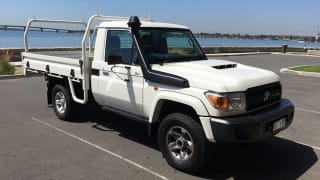
Toyota Land Cruiser GX single cab 2017 review
Andrew Chesterton road tests and reviews the new Toyota LC70 LandCruiser GX single cab with specs, fuel consumption and verdict.
Browse over 9,000 car reviews
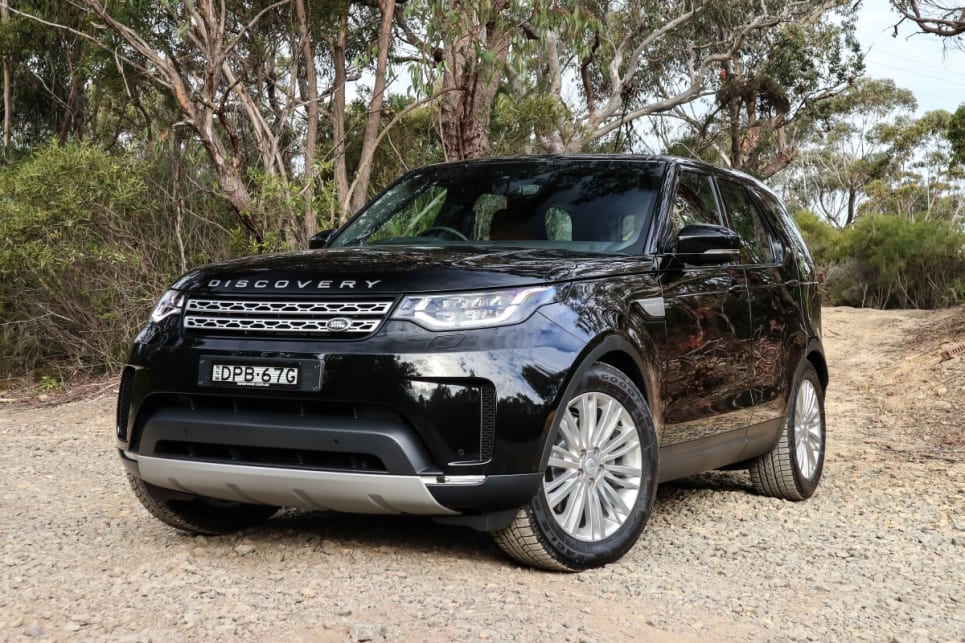
Land Rover is not holding back on the hyperbole for its brand new, fifth-generation Discovery large SUV.
Packing in a load of tech on top of a chassis that also underpins the Range Rover Sport, does Land Rover have what it takes to build, as it says, the ultimate family SUV?
| Land Rover Discovery 2017: TD4 HSE | |
|---|---|
| Safety rating | |
| Engine Type | 2.0L turbo |
| Fuel Type | Diesel |
| Fuel Efficiency | 6.2L/100km |
| Seating | 5 seats |
| Price from | $61,160 |
The Discovery is not what you’d call entry level motoring, with our Sd4 HSE diesel-powered tester starting at $96,950 before on-roads.
This puts it in the mix with rivals like the Toyota LandCruiser VX, Volvo XC90 D5 and Audi Q7 3.0 TDI.
It comes standard with dual-zone climate control, standard cruise control, an eight-speed automatic gearbox linked to a four-by-four system, Land Rover’s Terrain Control Management mode, and a touchscreen multimedia system with Bluetooth streaming, sat nav with speed indication and camera warnings.
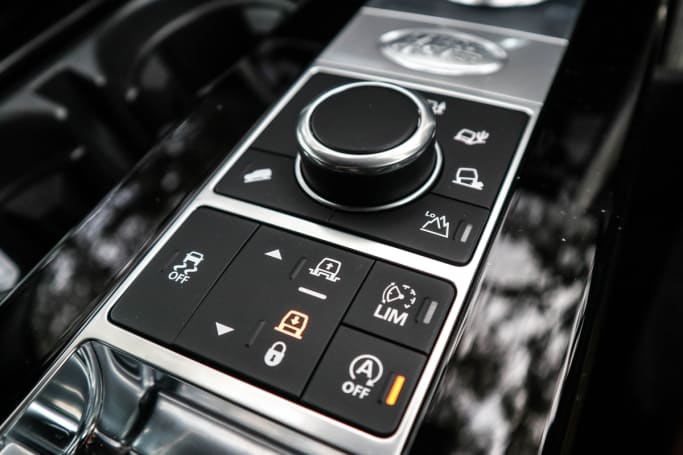
The options list is long, and our car came fitted with more than $21,000 of them, including an electric sunroof ($4280), Windsor leather seats with 16-way electric front control ($4150), a third row of electrically controlled seats ($3400), an upgraded InControl Connect Pro multimedia system ($2200), metallic paint ($2010) and more, taking our sticker price to $118,000.
At first blush, this may seem expensive, but bear in mind that most large SUVs are priced well over $50,000, and the Land Rover is also engineered for serious off-road duty. However, the cost of options can soon push the Disco into ‘very expensive’ territory.

The Disco is certainly a striking car. It blends elements of Discoverys of days gone by - in particular its stepped roof line - with the more modern, sleek shapes taken from cars like the new Range Rover Velar.
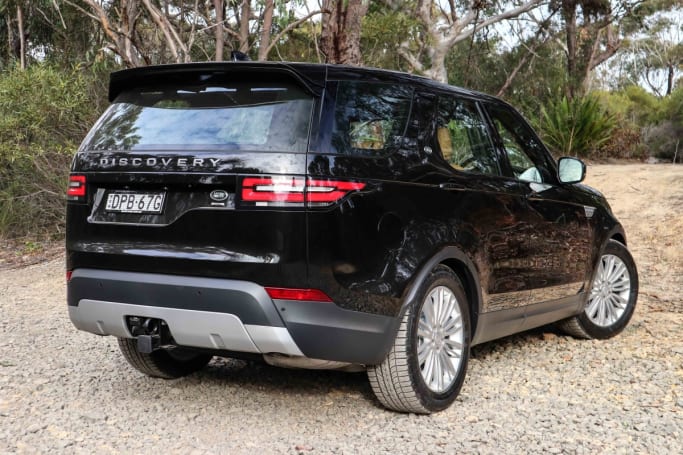
The sharply contemporary front end, blistered guards, asymmetrical rear end and its sheer size certainly make it stand out from a design point of view.
The short front and rear overhangs - the distance between the wheels and the absolute edges of the car - also give the Land Rover greater ability to scramble up and over rough terrain.
Our Sd4 tester also eschews the larger rim and lower profile tyre combo that is so prevalent in premium-level SUVs, and the higher sidewall, semi-off-road spec tyres on the 18-inch rims also give the car a distinct character.
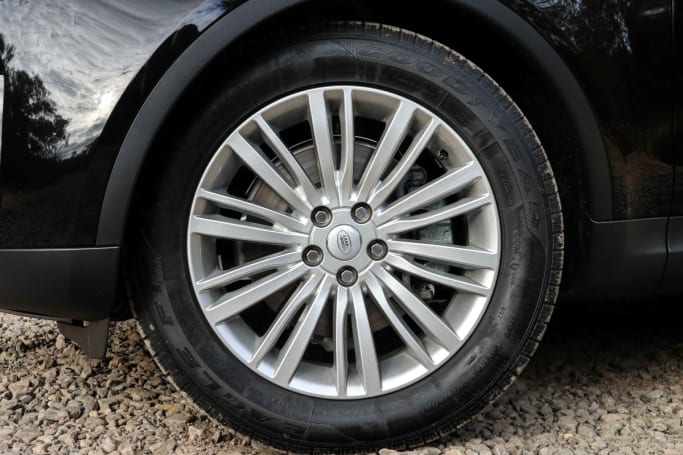
Inside the Disco, it's reasonably familiar to anyone who has sampled any type of Jaguar Land Rover product over the last couple of years. The eight-speed gearbox operates via a rotary dial that rises from the centre console in alluring fashion.
There's also a large capacitive touchscreen in the centre, which controls the majority of the car's functionality, and a regular two-dial instrument cluster sits ahead of the driver.
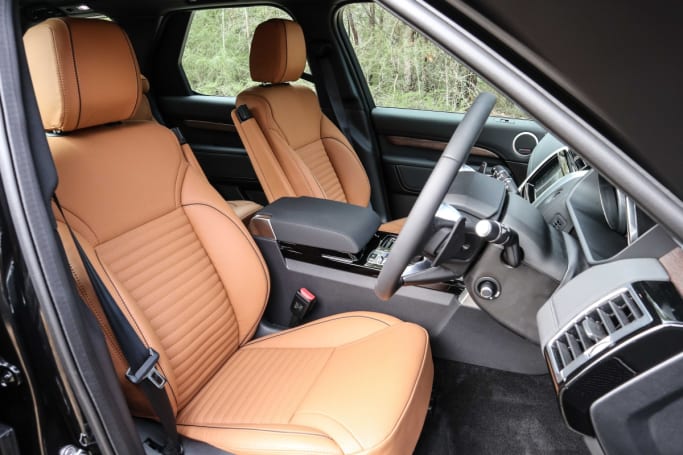
The interior is tastefully understated, with lots of straight lines and bluff surfaces, all covered with premium materials, and the dark headlining shrinks the car around its occupants.
The Disco can be specced as a seven seater at a $6800 premium and, as you'd expect from a vehicle that's over four and a half metres long, there is a decent amount of room inside the cabin.
The seating array itself is very flexible and controlled via electric switches that raise and lower the second and third row of seats in whichever configuration you need.
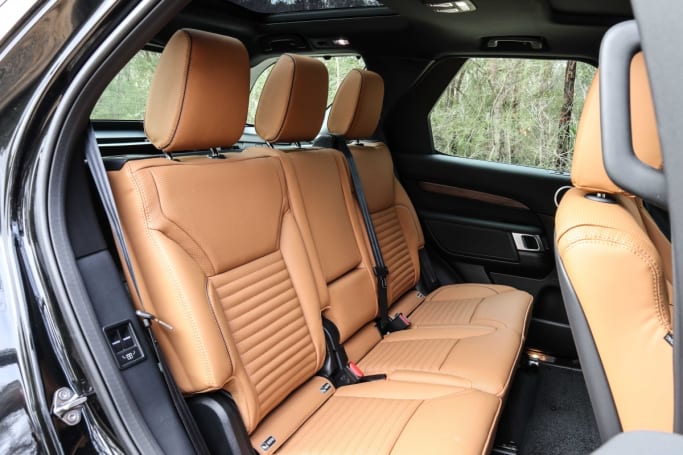
The front seats are mounted quite high, and the seat base is just a fraction too short to be comfortable on longer journeys. It's also quite bulky under the thighs, which does make the legs ache after a long trip. It’s a surprising oversight for a long-range tourer, and we’d like to sample the stock seats rather than the optional leather versions fitted to our tester.
Visibility from the driver's seat is good looking forward, but is compromised over the shoulder, thanks to the combination of the large headrests in the second row and quite thick C-pillars in the small glass area.
Storage is well taken care of. There's a pair of fore/aft cupholders in the centre that slides, Thunderbird-style, back into a recess to reveal a very large and deep storage container underneath.
The centre console bin is also large and square and quite deep, and also hides two USB ports, a SIM card holder, 12-volt port, and a HDMI cable socket.
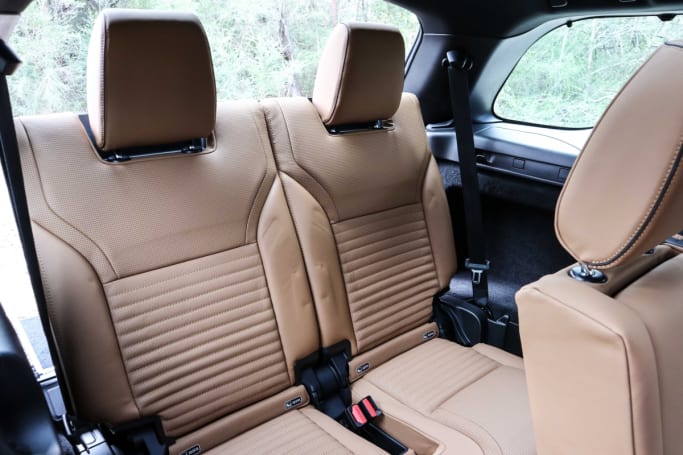
A second 12-volt socket is located underneath the dash, along with a shallow receptacle to hold wallets and phones. There are cup holders in the centre rear armrest and there is a capacity to hold bottles in all four doors, although the rear door pockets are quite small and suitable only for smaller bottles.
The rear seats can be reclined in the upright plane, and interestingly there is virtually no transmission tunnel on the floor in the rear, which makes for a better time for the middle rear seat passenger.
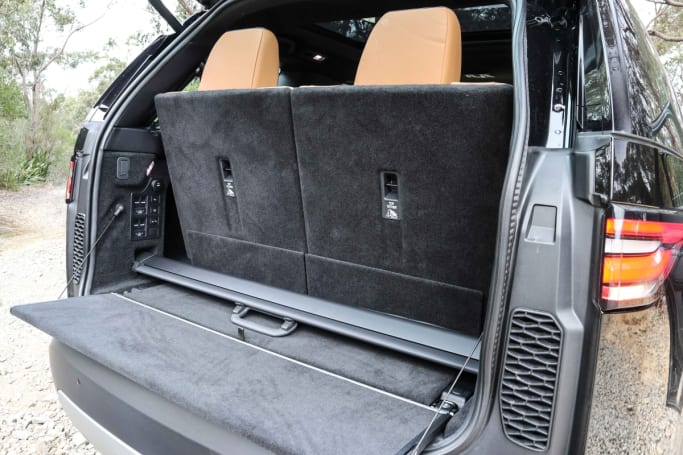
Second-row access is great thanks to large door apertures, although the step up is high. Access to the third row, meanwhile, works via a sliding-rail for the second row, and there’s enough room back there even for a 185cm adult. Going seven-up results in absolutely zero luggage space, however.
There are two flip-up bins that hide a small bottle holder, a USB port and a little bit of storage space for occupants of that third row.
In the rear, the last two seats fold flat into the floor and are completely hidden away when not in use, and Land Rover's unique tailgate seat is present and correct.
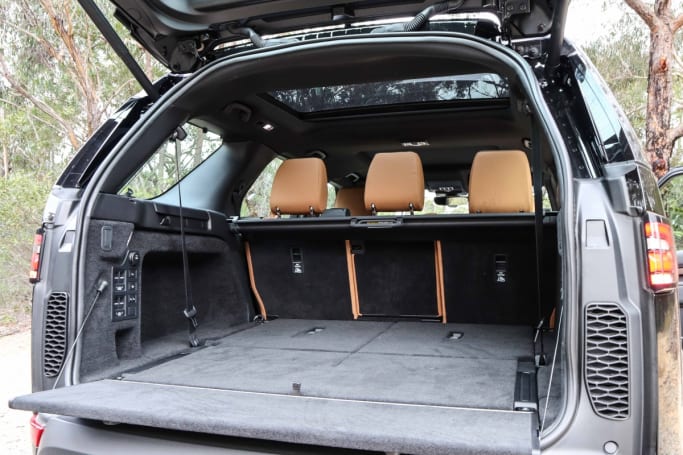
It's a strange little perch that in does help to retain cargo in the space, but also raises the load height to an awkward level, so that putting in prams and boxes and the like can become awkward, even when it's lowered. We certainly wouldn’t option our Disco with one.
There are ISOFIX points on the outside seats in the centre row as well as full climate controls for second-row passengers. There are also two USB ports for charging devices.
Coming back to the driver, the classically styled steering wheel is large and easy to use and has basic entertainment and cruise control functions on board.
Most switchgear is simple to access and easy to use, and Land Rover's terrain command drive mode system in the centre console allows the driver to select from different off-road programmes for the Disco, including sand, gravel, and snow, rock crawling, and other off-road features.
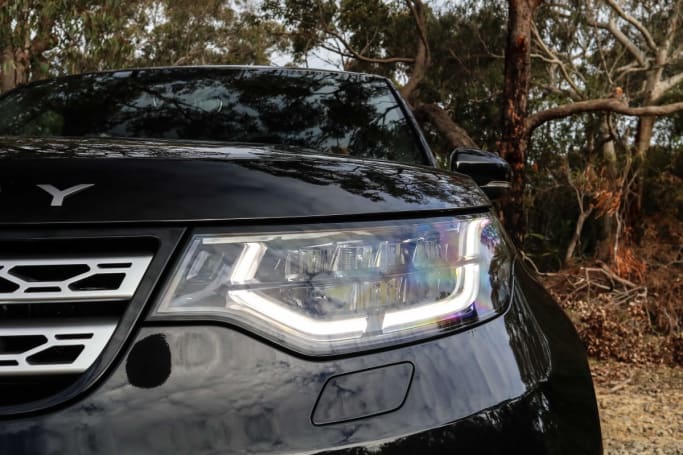
The satellite-navigation system installed in our Disco also warns the driver of upcoming speed and red light cameras, even if you're not using sat-nav at the time, which is a nice touch.
There’s also extra bright LED lighting throughout, along with very good headlights, and a full size spare wheel resides under the boot floor.
It's a bit of a strange one, the Disco. The on-road manners are not as precise as I might have expected in an ultra-modern SUV, with an overly-soft character in the suspension tune, even in normal mode, along with ultra-light and unresponsive steering, which makes it a little bit of a chore to drive in the city.
Even the brake pedal feel is not quite where you'd expect a modern car to be, with a long throw and less than ideal modulation. It needs a lot more of a push from early in the stop to actually make the big car pull up with any sort of authority. It's not that they don't work; it's just an unusual feel for a car that will predominantly spend its life in urban terrain.
The steering is simply not feelsome enough, either. It's very hard to tell where the front wheels are pointed at any stage, and the light feeling doesn't change much, no matter what the speed.
It does make it easy to manoeuvre, but a little more weight at medium to highway speeds would be a nice feature, and would stop the car being so fidgety over a longer distance.
The 2.0-litre, four-cylinder turbocharged Ingenium diesel engine aboard the Disco does an amazingly good job of propelling the two-plus-tonne vehicle with poise and with punch.
You really have to keep reminding yourself that the engine is one with a relatively small capacity, because the torque curve is plentiful, available from reasonably early in the range, and can get you up to highway speeds in no time at all.
Throttle travel in the Disco is in keeping with the rest of the car in that it's not quite what you're used to, even in a large SUV. It's very long and very gradual, which does help with off-road work, but it feels like there's a lag when you push down on the throttle in town.
It feels like a very off-road trait for a car that will spend a lot of its time on the road.
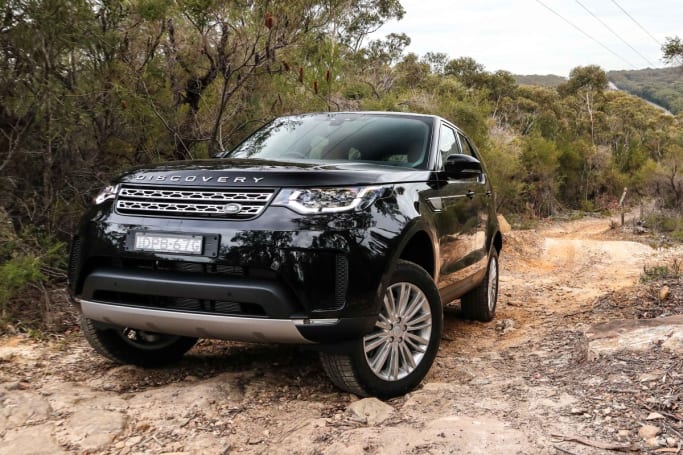
When you do put its tyres in the dirt, however, the Land Rover really comes to life. We tested it briefly over some steep rocky terrain with washouts, loose gravel and high water bars.
Simply by turning the mode dial to the correct program, the car will basically figure it all out. It uses airbag suspension and can raise itself quite a distance to help you clear obstacles. It can also plonk itself in low gear; although you do need to put the car in neutral first before it will engage low-range mode.
Once you're ready to descend a rocky slope and the correct mode is engaged, the Land Rover serenely ratchets itself down any type of terrain you care to throw at it. The more off-road spec tyres of our tester also helped in this regard.
If you do want to take yours off-road, then be mindful of which tyre spec and rim you option for your car, because the more expensive, larger rims may look cool, but they will not do as well in off-road situations.
The Ingenium 2.0-litre four-cylinder turbocharged diesel engine aboard the Sd4 makes 177kW at 4000rpm, and 500Nm of torque at a low 1500rpm.
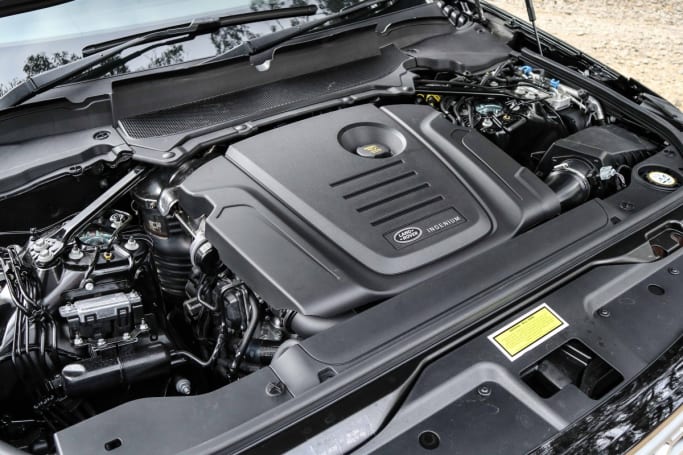
The full-time 4WD system is based around an eight-speed automatic gearbox that works in conjunction with a two-speed transfer box and Land Rover’s electronic terrain management system.
Despite a weight of over 2180kg, the small diesel makes short work of pushing the Disco around either in the city or out on the freeway. As mentioned, the long throttle takes a little getting used to, but there’s no doubting its strong torque.
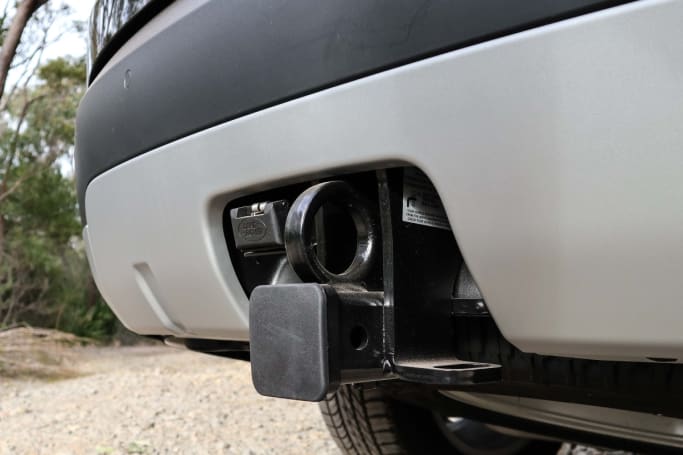
It’s also rated to tow up to 3500kg of braked trailer, and all Discoverys are sold with a tow bar kit as standard.
Land Rover rates the Discovery diesel’s combined fuel economy figure at 6.5 litres per 100km, while we recorded 9.2L/100km over 380km.
We achieved that result with a literally brand new car with less than 100km on the odo. The Discovery’s 77-litre tank fuel tank gives it a theoretical range of around 1185km on a single tank, which is pretty handy in the world of large SUVs.
Basic Warranty
3 years / 100,000 km warranty
ANCAP Safety Rating

The Discovery range has been awarded the maximum five-star ANCAP safety rating, with six airbags (front, front/side and curtain), a reversing camera, AEB and Lane Departure Warning fitted on every model, along with the usual suite of traction control and braking aids.
Land Rover recommends servicing the Discovery every 24 months or 32,000km, and it offers a fixed-price service plan. All filters and oils are included, as well.
It offers a three-year, 100,00km warranty as standard, with free roadside assistance for the duration of the warranty.
On balance, the Disco makes for a great, serene, comfortable, long-distance cruiser. However, it's not as precise as you might expect from a modern car.
It feels like it has been oriented towards more off-road work, and perhaps the profile of a typical Discovery driver will see this generation of car tackle more dirt tracks and sandy trails than might otherwise be the norm.
For the rest of the time, though, there are compromises – soft ride, overly light steering, odd accelerator and brake pedal feel - that you do have to live with, and whether you're happy with them or not, it is really up to the individual.
| Vehicle | Specs | Price* | |
|---|---|---|---|
| TDV6 Graphite | 3.0L, Diesel, 8 SP AUTO | $45,540 – 52,910 | 2017 Land Rover Discovery 2017 TDV6 Graphite Pricing and Specs |
| TDV6 | 3.0L, Diesel, 8 SP AUTO | $53,350 – 61,270 | 2017 Land Rover Discovery 2017 TDV6 Pricing and Specs |
| SDV6 Se | 3.0L, Diesel, 8 SP AUTO | $61,600 – 70,840 | 2017 Land Rover Discovery 2017 SDV6 Se Pricing and Specs |
| SDV6 Landmark | 3.0L, Diesel, 8 SP AUTO | $66,330 – 76,230 | 2017 Land Rover Discovery 2017 SDV6 Landmark Pricing and Specs |
| Price and features | 7 |
|---|---|
| Design | 8 |
| Practicality | 7 |
| Driving | 6 |
| Under the bonnet | 8 |
| Efficiency | 7 |
| Safety | 8 |
| Ownership | 7 |
$25,995
Lowest price, based on 54 car listings in the last 6 months